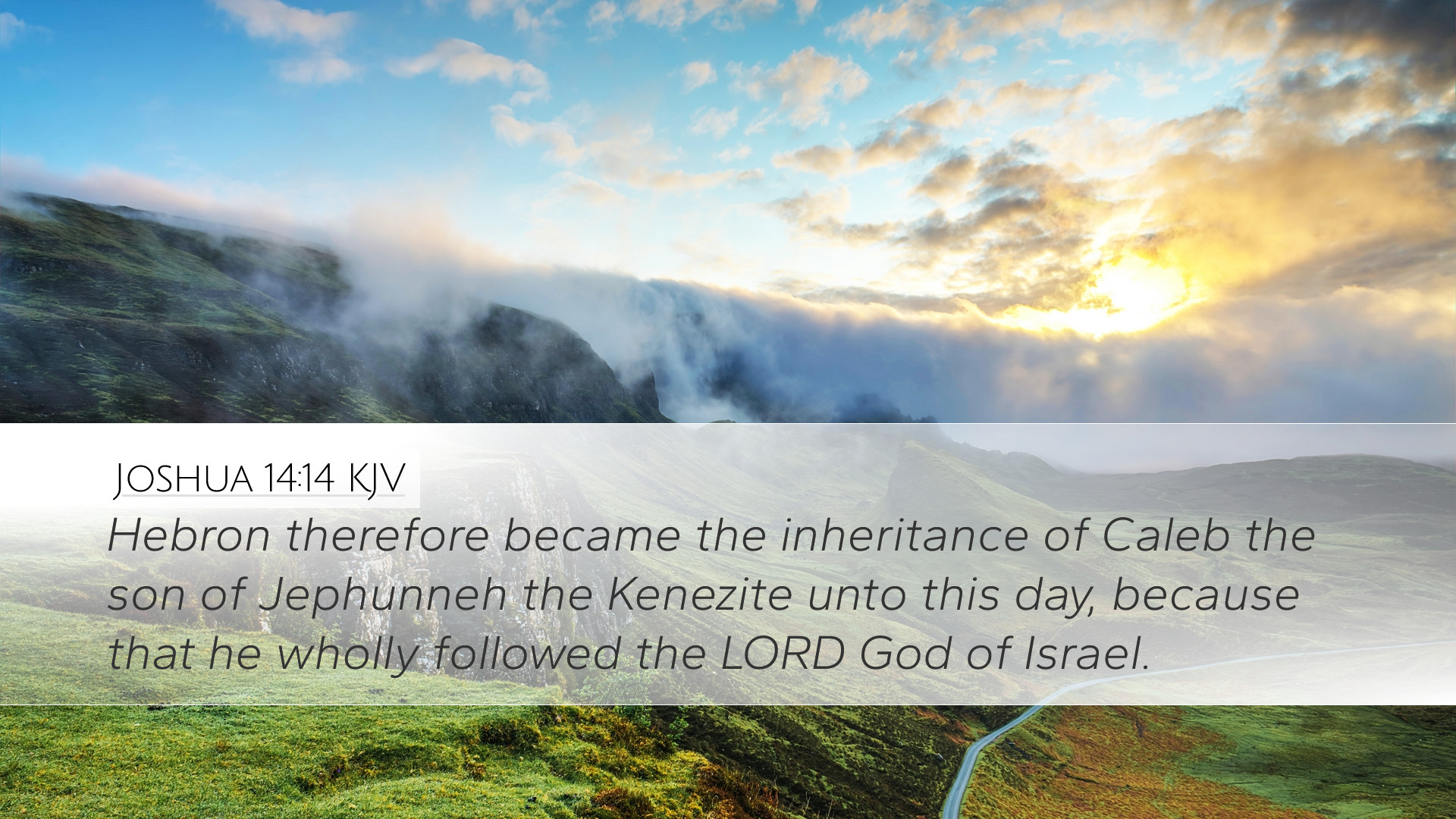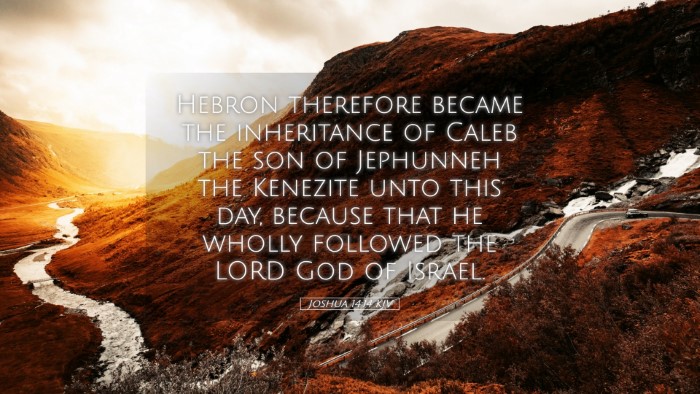Old Testament
Genesis Exodus Leviticus Numbers Deuteronomy Joshua Judges Ruth 1 Samuel 2 Samuel 1 Kings 2 Kings 1 Chronicles 2 Chronicles Ezra Nehemiah Esther Job Psalms Proverbs Ecclesiastes Song of Solomon Isaiah Jeremiah Lamentations Ezekiel Daniel Hosea Joel Amos Obadiah Jonah Micah Nahum Habakkuk Zephaniah Haggai Zechariah MalachiJoshua 14:14
Joshua 14:14 KJV
Hebron therefore became the inheritance of Caleb the son of Jephunneh the Kenezite unto this day, because that he wholly followed the LORD God of Israel.
Joshua 14:14 Bible Commentary
Commentary on Joshua 14:14
Joshua 14:14 states, "Therefore Hebron became the inheritance of Caleb the son of Jephunneh the Kenizzite unto this day, because that he wholly followed the Lord God of Israel." This verse underscores the reward of faithfulness and the fulfillment of God's promises. The historical significance of Hebron and the character of Caleb are pivotal elements in this narrative.
1. Contextual Background
To fully appreciate Joshua 14:14, it is essential to understand the background of the Israelites' entry into Canaan. After wandering in the wilderness for 40 years, the Israelites were finally poised to enter the Promised Land. The land was divided among the tribes, and Caleb, who had been a faithful spy 45 years prior, was granted Hebron as his inheritance.
2. Caleb's Character and Faithfulness
Caleb stands out as a model of faith, courage, and perseverance. His character is beautifully emphasized in the public domain commentaries:
- Matthew Henry highlights that Caleb's unwavering faith in the promises of God exemplifies a true believer's heart: “Caleb was not deterred by the fear of giants or fortified cities but remained confident in God's ability to deliver what He had promised.”
- Albert Barnes points out that Caleb's faith led him to request Hebron specifically: “He asked for that which had been represented as impossible, yet he was assured of victory because he believed God’s word.” This generation knew the risk of failure; Caleb, however, believed in God's power over circumstances.
- Adam Clarke notes that Caleb's faith was complemented by his action. He did not merely accept God’s promises passively but actively sought them: “It was not sufficient for him to hear the promise; he demanded to fully possess what God had guaranteed to him.”
3. The Significance of Hebron
Hebron holds considerable significance in the biblical narrative. It served as a city of refuge and a place of importance to the patriarchs.
- Matthew Henry notes: “Hebron was known for its steep hills and was a place where the patriarch Abraham dwelled,” which symbolizes it being not just a physical inheritance but spiritually rich as well.
- Albert Barnes comments on the tribal significance: “This territory was a fortified place important to Israel's identity and future, as it was closely tied to the heritage of the patriarchs.” Caleb's claim over Hebron resonates with the history of God's chosen people.
- Adam Clarke reflects on the conquest of Hebron: “By securing it, Caleb established a legacy of faith that God’s promises are indeed fulfilled; the city became a symbol of faith rewarded.”
4. Theological Implications
The verse is rich with theological implications for understanding God’s faithfulness and the response of His people:
- Faithfulness Rewarded: The narrative is a testament to God’s promise that obedience and faith do not go unrewarded. Caleb’s inheritance is symbolic of the ultimate spiritual inheritance that awaits those who trust in the Lord.
- God's Sovereignty: This story emphasizes God's sovereign choice of who inherits the land. Despite perhaps more qualified candidates, God awards Caleb because he 'wholly followed' Him, underscoring the principle that God's selection often defies human expectations.
- The Importance of Perseverance: Caleb’s dedication over decades illustrates profound perseverance in the face of trials, a characteristic vital for spiritual maturity. This is an encouragement to believers to hold steadfastly to God's promises amid challenges.
5. Lessons for Today’s Believers
For contemporary readers, Joshua 14:14 affords several applicable insights:
- Wholehearted Commitment: Caleb's legacy serves as a challenge for Christians to pursue God zealously, fully engaging in the mission set before them.
- Hope and Promise: The assurance that God fulfills His promises provides believers with comfort and hope as they engage with their own 'promised land' in faith and service.
- Legacy of Faith: The call to leave a legacy that honors God, ensuring future generations can see the fruit of faith, is an essential reflection for today’s church and households.
Conclusion
Joshua 14:14 encapsulates the heart of faith transcending generations. Caleb's journey from the wilderness to claiming Hebron demonstrates that steadfast faith, rooted in God's assurances, is rewarded abundantly. This commentary draws from the insights of celebrated scholars and invites believers to reflect on their walk with God, encouraging a life wholly dedicated to Him.


